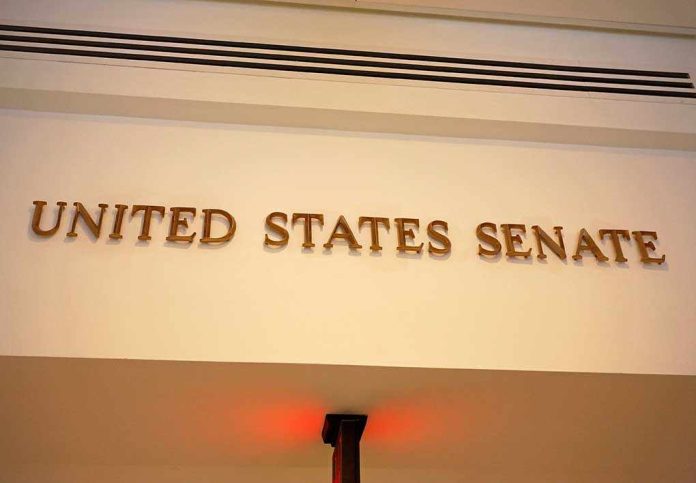
When a senator’s home becomes the epicenter of a bomb threat hours after being branded a traitor by the president, the question is not just about who crossed the line—it’s about how dangerously thin the line has become.
Story Snapshot
- A bomb threat targeted Sen. Elissa Slotkin’s home the day after Trump accused her and other Democrats of sedition and referenced the death penalty.
- Slotkin, a national security veteran, was among lawmakers urging military personnel to resist illegal orders, prompting Trump’s explosive online rhetoric.
- Similar threats followed at offices of other Democratic lawmakers, creating a chilling effect and ramping up security nationwide.
- The incident spotlights the real-world consequences of inflammatory political speech and the escalating risks faced by public officials.
Accusations of Treason Ignite a Firestorm
President Donald Trump posted to Truth Social, accusing Senator Elissa Slotkin and several Democratic colleagues of “sedition” and “traitor” behavior for releasing a video urging military personnel to refuse unlawful orders. He didn’t stop at name-calling—he referenced “seditious behavior, punishable by death.” The next day, Michigan State Police responded to a bomb threat at Slotkin’s Oakland County home. Slotkin, a former CIA officer and defense official, was not home during the incident, but the timing was impossible to ignore. Law enforcement found no explosives, but the message was clear: political speech had spilled into real-world danger.
The pattern didn’t end there. Within hours, bomb threats were reported at the offices of Rep. Chrissy Houlahan and Rep. Chris Deluzio, both Pennsylvania Democrats also featured in the video. Slotkin’s office reported hundreds of threats since Trump’s posts, and similar surges were confirmed by other targeted lawmakers. The U.S. Capitol Police and local police forces scrambled to provide extra security as the boundaries between online provocation and actual violence blurred yet again.
Veterans and Intelligence Hawks in the Crosshairs
The lawmakers targeted were hardly political rookies. Slotkin, Houlahan, Deluzio, and their colleagues have deep national security credentials—former intelligence officers, military veterans, defense officials. Their joint video was not some fringe protest; it was a deliberate warning about the dangers of unlawful orders and the importance of civilian control over the military. In today’s hyper-polarized environment, that message became the trigger for a new round of threats—a direct reflection of the volatile intersection where military policy, political rhetoric, and social media outrage now meet.
Trump’s online megaphone continues to wield outsize influence, especially with his most energized supporters. Law enforcement agencies have long warned that incendiary statements from high-profile figures can translate into real threats and violence. The Capitol attack on January 6, 2021, provided a blueprint; the current wave of threats against Slotkin and her colleagues seems to follow the same pattern, but with the stakes climbing ever higher.
Law Enforcement, Security, and the Chilling Effect
Michigan State Police and the U.S. Capitol Police confirmed their response to the bomb threat at Slotkin’s home and stepped up security for lawmakers nationwide. As of November 23, 2025, no explosives had been found and no suspects had been named, but investigations continued. Slotkin’s office thanked law enforcement and underscored the seriousness of the threats, while the White House tried to tamp down the firestorm, clarifying that Trump’s comments were not intended as literal calls for execution. Yet the damage—in fear, in heightened tension, in the chilling of political debate—was already done.
Security experts warn that each rhetorical escalation makes it harder for public officials to do their jobs and easier for would-be attackers to justify violence. The cost is not just in dollars for extra security or law enforcement overtime—it’s in the erosion of norms, the suppression of debate, and the creeping sense that public service now carries an unacceptable level of personal risk. As threats multiply, so do the calls for new protocols, reforms, and—inevitably—debates over the limits of protected speech in an era when words can so quickly become weapons.
Deeper Roots, Long Shadows, and Unanswered Questions
This bomb threat is neither isolated nor unprecedented. In the years since the Capitol riot, threats against elected officials have soared, especially when political rhetoric reaches a fever pitch. The targeting of lawmakers’ homes and offices is a symptom of a broader sickness—one where the politicization of the military and intelligence community is not just a beltway talking point, but a frontline issue. Slotkin and her colleagues, as both national security professionals and political targets, embody the risks facing anyone who stands up in this new climate.
Trump’s defenders insist his statements are hardball politics, not incitement. Critics point to the clear sequence: public accusation, online amplification, real-world threat. The truth may be debated, but the consequences—for Slotkin, for Congress, for American democracy—are not. The open question is whether these events will force a reckoning over the boundaries of political speech and the urgent need to rebuild guardrails that once seemed unbreakable.



